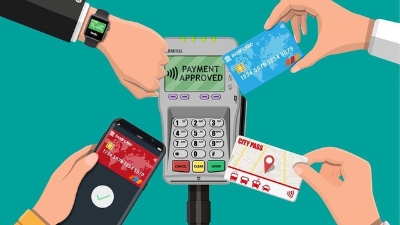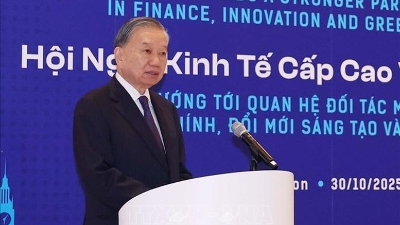Vietnam's banking industry gathered in Hanoi on May 8 for its annual Digital Transformation Day, a high-profile event that underscored the sector's pivotal role in propelling the nation's digital drive.
Amid fanfare, Prime Minister Pham Minh Chinh outlined an ambitious vision for lenders to pioneer this revolution. His wide-ranging speech laid out three overarching goals and six key tasks, crystallising the government's expectation that banks will be at the vanguard of building a digital economy, society and citizenry.
Vietnam's digital transformation agenda has gained significant momentum in recent years amid growing recognition that technology is a strategic imperative for rapid, sustainable development.
For 2024, the national theme is "Digital Economy Development", underpinned by four pillars: fostering the IT industry, digitalising all economic sectors, enabling digital governance, and unlocking digital data as a powerful catalyst.
Within this overarching framework, the banking industry has been assigned a mission of paramount importance. As the "lifeblood of the economy", lenders' digitisation impacts nearly every sphere of commercial activity and public service delivery.
Speaking before an audience of top bankers, regulators and expert observers, Mr Chinh lauded the industry's accomplishments thus far, which have established a solid foundation.
But he emphatically stressed the need for intensified, concerted efforts to overcome myriad challenges and take digitalisation to sweeping new heights.
Significant Strides, but a Long Road Ahead
Vietnam's banking digitalisation has undoubtedly yielded tangible, encouraging results over recent years. Non-cash payments have proliferated at a breakneck pace nationwide, with both the number of users and total transaction values surging rapidly.
Adult payment account ownership has soared to 87%, exceeding the 80% target originally set for 2025 – a remarkable feat testifying to banks' aggressive promotion of digital financial inclusion.
The explosive growth of mobile and internet banking channels illustrates the profound changes underway. Mobile payment transaction volumes have skyrocketed by over 100% annually, while internet banking has expanded at a blistering 50% clip.
Nearly half of all bank customers now use non-cash payment methods regularly. Most strikingly, the combined value of non-cash payments in 2023 was a towering 23 times greater than Vietnam's entire GDP for the year.
Underpinning this boom has been the rapid build-out of robust electronic payment infrastructure designed to ensure uninterrupted, glitch-free operation at scale.
Outages and system logjams that could undermine public trust are now the exception rather than the norm. Lenders have also collaborated extensively with the Ministry of Public Security to integrate banking services with Vietnam's national digital ID ecosystem.
Customers can now authenticate seamlessly and securely using embedded biometrics in chip-based citizen ID cards, digital signatures, and the VNeID electronic identity platform.
Beyond simplifying access, banks have embraced cutting-edge technologies to enhance user experience and convenience. Facial recognition, one-touch payments, QR codes and other innovations have proliferated.
Big data analytics are being harnessed to improve credit scoring and underwriting for individual and corporate borrowers. Online payments have been woven into a rapidly expanding universe of services spanning utility fees, taxes, hospital bills, tuition instalments, transportation, fuel purchases, e-commerce transactions and more.
This digitisation thrust has catalysed broader transformation within banks themselves. Over 90% of all work records are now processed and stored electronically rather than on paper.

On the public-facing front, online banking services available via the National Public Service Portal have vastly expanded. In 2023 alone, nearly 14.6 million accounts were created and 46.2 million documents submitted through this one-stop digital hub.
An eye-popping 26.8 million online payment transactions worth over 12.9 trillion dong ($510 million) were also processed.
By the government's estimates, the essential public digital services undergirded by banking system integration have generated annual savings of 3.5 trillion dong ($138 million) for the state and society at large.
This pot has been further sweetened by 41 out of 53 essential administrative procedures being elevated to the highest levels of online functionality, enabling cashless, paperless, presence-free processing from submission to completion.
However, Vietnam's digital banking transformation is still a work in progress battling stubborn obstacles on multiple fronts.
Despite the auspicious beginnings, Prime Minister Chinh candidly acknowledged that a raft of regulatory and policy shortcomings are hampering quicker progress.
A prime example is Decree No. 73 governing IT investment using state funds, which has not been updated since its 2019 promulgation to keep pace with rapid technological shifts.
More critically, two long-awaited legal milestones are still stuck in limbo. The first is a hotly anticipated decree to finally permit controlled testing and pilots of innovative new digital banking products and services based on emerging technologies like blockchain and AI.
The second is an overarching new decree to modernise the regulatory framework governing non-cash payments in line with global best practices.
Infrastructure inadequacies are another significant stumbling block. While banks have prioritised investments, 5G commercial deployment and large-scale data centre build-outs still lag projections across Vietnam.
This could increasingly strain digital systems as data-intensive services like video banking and AI-powered analytics take off. Unresolved capacity constraints would hinder seamless service delivery while also concentrating cyber-risks that are already multiplying at an alarming pace.
On the cyber front, Prime Minister Chinh revealed that Vietnam's banking sector had fallen victim to nearly 2,400 separate attacks in just the first quarter of 2024 alone.
Ransomware and other insidious threats targeting financial institutions have grown more sophisticated and pervasive globally, requiring more robust countermeasures.
While regulators are ramping up defences in coordination with police and intelligence agencies, this ominous trend injects significant uncertainty into digitisation plans.
A shortage of manpower is yet another formidable bottleneck. Domestic fintech startups driving innovation in areas like mobile payments, peer-to-peer lending and robo-advisory services remain relatively limited in number and scale compared to regional powerhouses.
Crucially, there is also an acute shortfall of top-tier digital talent within banks themselves – the highly skilled professionals adept at fields like data science, cybersecurity, cloud computing and AI who will be indispensable to realising Vietnam's digital banking vision.
In short, though remarkable strides have been made, Prime Minister Chinh made clear that lenders cannot afford to be complacent. Sustaining digitalisation's momentum will require redoubling efforts to overcome daunting institutional, technical and human capital constraints.
The future pathway, while highly promising, will be an uphill journey fraught with obstacles and challenges that will test the industry's resolve and resourcefulness.
A Bold Roadmap for the Digital Future
To supercharge progress, the Prime Minister outlined three overarching goals that should anchor banking's digital transformation strategy going forward.
Foremost is enabling maximally convenient, affordable access to financial services and products for Vietnamese individuals, businesses and government agencies across the board.
This entails seamless digital onboarding, frictionless daily banking experiences, diverse product offerings tailored to customers' needs, and fully integrated services spanning application to payment.
The second aim is to boost efficiency by stripping away the burdens and costs associated with outdated manual processes and compliance procedures.
By radically streamlining workflows and operations through automation, Vietnamese lenders can compress overhead outlays, pass on savings to customers and staff, and reallocate finite resources towards higher-value activities that drive growth.
Third and most crucially is to enhance risk management and controls by embedding rigorous safeguards spanning user authentication, transactions monitoring, data security and regulatory screening.
This would clamp down on illicit financial flows and root out fraud, money laundering, corruption, harassment and other criminal activities that could undermine trust and stability. It would also shield customers and institutions themselves from costly cyber breaches and scams.
Underpinning these three topline objectives are five core principles that Prime Minister Chinh stressed must guide banking digitalisation every step of the way.
The first is adhering closely to the ruling Communist Party's policies, laws and strategic orientation for nurturing a digital economy and society. This is essential to ensure the sector's transformation efforts remain aligned with national priorities while maintaining monetary and financial system stability.
The second principle is to judiciously capitalise on both the opportunities and challenges ushered in by the Fourth Industrial Revolution.
This means striking a balance between harnessing frontier technologies like AI, cloud computing, blockchain and IoT when appropriate and managing their risks and disruptive impacts on things like cybersecurity, privacy and workforce displacement.
It also involves nurturing symbiotic linkages with emerging economic models like the sharing economy, gig economy and circular economy that foster inclusive productivity gains and job creation for Vietnam's rising workforce.
Third is focusing digital initiatives through the lens of bolstering Vietnam's economic competitiveness and development trajectory.

This means harnessing technology not just for banking modernisation, but as a catalyst to upgrade the country's industrial base, production capabilities, labour productivity and overall economic complexity.
It involves heavy investments in reskilling and upskilling to cultivate a digitally savvy workforce that can sustain Vietnam's transition into higher-value, knowledge-intensive industries. Strong human capital is crucial for narrowing development gaps with regional and global peers.
The fourth guiding principle is to pursue holistic, comprehensive digitalisation emphasising quality over mere quantitative metrics. Rather than disjointed, piecemeal projects, banks must reimagine end-to-end operations and services around digital delivery models.
Product suites must be diversified and upgraded in line with global standards. Cybersecurity and anti-fraud controls have to be rock-solid and multi-layered. Data governance frameworks ensuring privacy and ethical AI use are prerequisites, not optional extras.
Fifth and finally is the imperative of close coordination across government ministries, agencies and localities. Digital transformation is an economy-wide undertaking transcending any single industry's boundaries.
For synergies to be realised, banks must work hand-in-glove with other stakeholders like healthcare providers, education authorities, tax bodies and municipal administrations. Only unified, concerted efforts can catalyse the network effects required for Vietnam's digital ecosystem to flourish.
To realise this future vision, Prime Minister Chinh delineated a comprehensive, multi-pronged action plan centred on five strategic thrusts and foundational enablers.
On the regulatory front, modernising the policy framework to facilitate and nurture digital banking innovation is job one.
Top priorities are rushing out the long-awaited decree allowing controlled pilots of novel products and services, coupled with an overarching decree codifying new international best practices for non-cash payments.
But more broadly, the entire legal code must be scrutinised and updated to harmonise with recent legislation like the Laws on Identification and Electronic Transactions.
Infrastructural upgrades are the second thrust. Investments in more powerful, higher-throughput electronic payment systems and credit bureau infrastructure must be accelerated.
This is vital for handling the exponential surge in digital transaction traffic without crippling bottlenecks or disruptions.
Seamless integration between core banking platforms and government portals like the National Public Service Portal is also crucial for delivering unified, end-to-end digital experiences spanning service application to payment and everything in between.
The third prong involves digitalising banks' own internal operations and governance mechanisms to raise their institutional competitiveness and efficiency.
This means benchmarking against global best practices by adopting technologies for automated risk analytics, compliance monitoring, management information systems and decision support.
Core banking system overhauls factoring in national scale requirements are also on the agenda.
But technology by itself is not enough without developing comprehensive data utilities that generate insights for smarter products and services. Therefore, the fourth pillar highlighted by Prime Minister Chinh focuses on monetising Vietnam's unique strengths in residential data.
This means unifying national customer databases, linking them with the central population registry to enable biometric authentication, and layering on AI/Big Data analytics engines to tailor offerings based on individual profiles and behavioural patterns. However, robust cybersecurity and data privacy regimes will also be vital for ensuring public trust.
Last but not least is the need for a concerted human capital development push to cultivate the digital skills required for the future of money. Lucrative compensation packages and opportunities for mastering cutting-edge tools must be provided to attract top tech talent into banking.
Creative partnerships with universities, international organisations and digital powerhouses abroad can facilitate knowledge transfers and upskilling programs.
On the cyber front, Prime Minister Chinh stressed heightened cooperation between banks, police and intelligence agencies to enhance monitoring, threat detection and incident response capabilities.
With cybercriminals growing more sophisticated by the day, Vietnam's financial system cannot afford the vulnerabilities that enabled thousands of crippling attacks even in just the opening months of 2024.
Revamped supervisory mechanisms backstopped by advanced data analytics must be embedded for pre-emptive safeguards.
Looking ahead, Prime Minister Chinh made clear that digital transformation is not merely a technological endeavour, but a whole-of-nation mission to secure Vietnam's future prosperity and development.
While daunting obstacles must still be conquered, the nation's banking sector has demonstrated its commitment to leading this charge over recent years. Under the government's stewardship and strategic guidance, it will now redouble those efforts.
The road ahead will be long and fraught with speed bumps. But the digital promise is indisputably vast, from forging a dynamic, competitive economic engine to streamlining service deliveries that enhance quality of life for all Vietnamese citizens.
By fulfilling its trailblazing mandate, the banking industry can elevate the entire nation to new frontiers of growth and modernity over the coming decade and beyond. Success, however, is far from guaranteed - it will require unwavering resilience, agility and dedication to make this extraordinary vision a reality.









 Google translate
Google translate